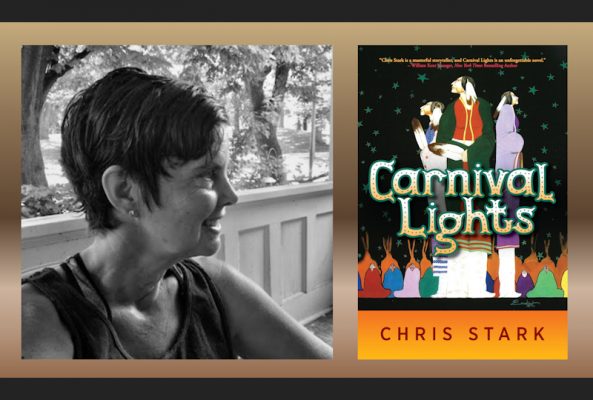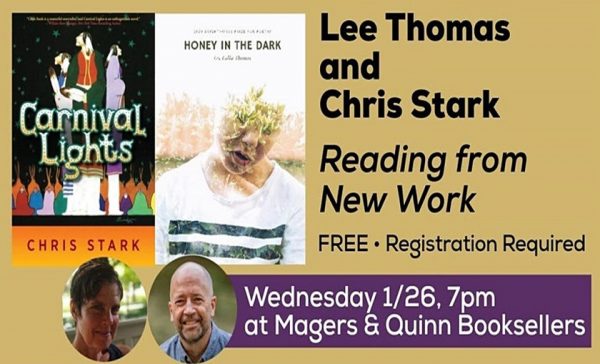Arts & Literature
‘The Bones’ – Chris Stark’s Sequel to ‘Carnival Lights’
The Bones by Chris Stark is a novel-in-progress that continues the stories of the protagonists in Carnival Lights and introduces new ones. The characters’ lives intertwine around a historical event called Project Man High, a US Airforce project that sent a man into the stratosphere using a gondola the size of a phone booth and a polyethylene balloon 1.5 mil inch thick, created and manufactured in St. Paul, Minnesota. Project Man High, a precursor to NASA, launched a man 19 miles into space out of an open mine pit in Crosby, Minnesota in 1957 on the Cuyuna Iron Range. The characters and their stories connect literally and thematically through time, land, and culture, with Project Man High as the central, unifying event. Sher and Kris’s story from Carnival Lights continues in The Bones, further revealing the girls’ fight to survive and their family’s bonds of love despite the impact of colonization, sex trafficking, and Missing and Murdered Indigenous Women and Relatives.
The following is an excerpt from The Bones, a sequel to Carnival Lights, winner of the NEMBA Award for Fiction and finalist for a Minnesota Book Award in Fiction.
January 21, 1956, Crosby, Minnesota
Thomas Leonard Brown, Jr. could not sleep. The January pre-dawn air, sifting through the windowpane and wood shingle siding scavenged in 1912 by the Czech miner who built the one-room shack, numbed Thomas’s face. He stared at the shadows on the ceiling. The moonlight reflected off the glittering snow in the yard, white as sheared lamb wool inside the quilts piled atop his and his brother’s bodies, making the ceiling slightly lighter than the rest of the pitch-black room. Thomas shifted his gaze to the window, at the base of the bed he and his younger brother, Elijah, slept on together. Covered in intricate feathery frost, what Thomas’s dad called “poor man’s art,” the window was the shack’s eye to the outside world.
Thomas pulled the top quilt over his nose. Elijah shifted, his small body entirely covered by the quilts made of patches of cotton cloth from pants and dresses that frayed and ripped too irregularly to be sewn back together along with flour sacks imprinted with red Indian headdresses and green roosters and yellow corn stalks, the silk outlined in blue. The boys’ dad snorted in his sleep on the other side of the blankets nailed to the ceiling.
Thomas had to go to the bathroom, but it was far too cold to dash to the outhouse. To maintain control over his bladder, he studied the ferns and bursting stars, his eyes tracing the dancing diamonds in the lines of crystalized water as they swirled, split, and cracked in dazzling patterns across the smooth pane of glass. Thomas half dozed. His mind drifted. He dreamed the moon sank in the sable sky, falling into the black-limbed forest. He dreamed the drifting moon cast a pale light on the mysterious disappearances. His foot jerked. He sat up. Thomas was not dreaming but watching an enormous luminous ball with a long tail drift sideways through the early morning sky. “What the…” he whispered.
“Tom-Tom?” Elijah murmured his name for his big brother.
“Shhh,” Thomas said. He placed his finger over his brother’s lips beneath the quilts. He glanced at the mysterious shape. It reminded him of filmstrips he’d seen in science class of shimmering jellyfish deep in the inky ocean. As he watched this thing in the sky, he slipped out of bed, pulled on pants over his long johns and a coat and jammed on his cap. He slipped through the blanket that separated the boys’ room from their parents’ room, glanced at his sleeping parents, and stepped into his dad’s work boots lined up in front of the red embers of the woodstove. The embers cast a warm, reddish-orange glow through the room, turning red the bottoms of Thomas Sr’s feet sticking out of a blanket, the legs of the chairs, and their mom’s glasses set on the floor next to her head. Thomas slipped into the negative eleven-degree air.
The moon’s translucent outline hung like an etching on the western horizon. He glanced at it just to make sure it was where it should be. A man in the moon, Thomas thought. But he’d never seen a face. Just craters, darker than the rest. Like pockmarks. As Thomas relieved himself, creating thin yellow chasms in the four-foot snowbank along the walkway, his eyes cast north to the ball, descending east above the Portsmouth Mine, an open pit mine in the northwest corner of town, the ball’s tentacles flowing behind it. A planet, he wondered. A Russian spy? Some kind of UFO? There’d been talk in town that something funny was going on in the woods. He buttoned his pants. The plunging jellyfish jerked violently and then sank into the forest. Thomas ran toward it.
He raced down the path he and Elijah dug to the street and then cut west toward the Portsmouth Mine. He kept to the streets, lined by six-foot-high hulking snowbanks, shaved down to ice-covered red dirt streets. He zigzagged through Crosby, the only town on the Cuyuna Iron Range laid out with a plan, due to Duluth businessman George H. Crosby who’d bought land once iron was found, tested the land to insure he would not discover iron under Crosby and have to pick up and move the town as Hibbing had done when the company discovered iron beneath it. George Crosby created a town to serve the mining companies.
As Thomas bolted through Crosby, his focus shifted between the glimmering sheets of red ice beneath his feet and the floating, shimmering translucent object sinking into the trees near Portsmouth. He meant to find that ball. He did not see the silhouette of a man leaning against Emanuel Lutheran Church, a newsboy hat jammed down to his eyes, his breath creating small clouds as he watched the Indian boy run. Thomas did not see his bulbous nose or the glowing tip of his cigarette or the butts piled like bones at the man’s feet.
Thomas cut north on 3rd Ave. As he ran out of town, the Portsmouth Mine to his left, he glimpsed the ever-present red glow from the mine through the bare stick trees. His dad once explained to him that the red hue was due to the iron being softer so it had to be processed different. “They sinter the iron there. Turns out like Cracker Jacks,” his dad said, handing his son a handful of iron Cracker Jacks. “Don’t eat ‘em. They’ll break your teeth.”
“Ok, pops,” Thomas Jr said.
His dad’s face was wooden. Then he tapped his son on his chest and they laughed together.
Thomas neared the mine, the glow now a starker, deeper red. The fire burning in the mine seemed like a monster to Thomas when he was a boy, a simmering violence—a warning–among the serene pine forests and fish gliding silently beneath holes chiseled through ten inches of ice. At the edge of town, Thomas caught sight of the object and swerved to the west, off the streets, and into the thigh deep snow.
About the Author
Chris Stark’s second novel, Carnival Lights was a 2022 Minnesota Book Award finalist and won the NEMBA Award for Best Fiction Book. Her first novel, Nickels: A Tale of Dissociation, was a Lambda Literary finalist. She has also published creative nonfiction essays and academic articles and conducted groundbreaking primary research. She has an MFA in Creative Writing from Minnesota State University, Mankato, and an MSW from the University of Minnesota Duluth. She has taught writing and literature at colleges and universities for twenty years. For more information, visit https://www.christinestark.com/.









